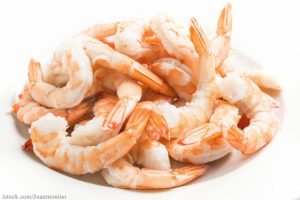After conducting a study that found antibiotics, which are illegal in shrimp farming, and bacteria that cause food poisoning on imported shrimp, Consumer Reports is calling on the U.S. Food and Drug Administration (FDA) to step up testing. The consumer watchdog wants Congress to increase funding to the FDA so it can inspect and test more imported shrimp and keep tainted products out of the foods supply.
 Americans eat more shrimp than tuna, consuming more than 18 million servings each day. Most of it, 94 percent, is imported from farms in Indonesia, Thailand and India. And most of it, 96 percent, is not inspected.
Americans eat more shrimp than tuna, consuming more than 18 million servings each day. Most of it, 94 percent, is imported from farms in Indonesia, Thailand and India. And most of it, 96 percent, is not inspected.
Consumer Reports purchased 342 packages of frozen raw and cooked shrimp from grocery stores, natural food stores and discount food clubs in 27 cities. Those stores include Costco, Kroger and Walmart.
Traces of antibiotics were found on 11 samples of imported raw farmed shrimp imported from Viet Nam, Thailand and Bangladesh. The samples were purchased at different stores including Albertsons, Costco, Fry’s Marketplace, Hy-Vee, Kroger, Sprouts Farmer’s Market and Walmart. The magazine stresses that it is not alleging that these retailers broke the law by selling the shrimp, rather that better law enforcement by the FDA is needed.
The use of antibiotics in shrimp farms is not approved by the FDA and it is illegal to import shrimp raised with antibiotics into the U.S. Antibiotic use in the food supply has been shown to contribute to antibiotic resistance which is a public health risk. It can also cause environmental problems if farm wastewater containing antibiotics is flushed into natural bodies of water. But enforcement of these laws meant to protect public health is weak. In 2014, the FDA tested less than 1 percent of imported shrimp.
Consumer Reports also found bacteria that cause illness including E.coli and Vibrio on shrimp they tested. About 60 percent of raw shrimp samples tested positive for bacteria. Vibrio, which is most commonly associated with oysters, is not one of the bacteria that shrimp are tested for.
The magazine is calling on the FDA to step up testing at U.S. ports and at shrimp farms and processing plants overseas and to add Vibrio to the list of bacteria that shrimp are tested for. The FDA’s response to the magazine’s research is that rules proposed under the Food Safety Modernization Act may help to address some of these issues.
When shopping for shrimp, the magazine advises that consumers understand labels and look for meaningful ones. For example, there are no federal guidelines for seafood that define the terms “natural” or “organic.” Consumer Reports recommends consumers look for the labels Naturland, Whole Foods Market Responsibly Farmed, and Farmed Responsibly ASC Certified.




